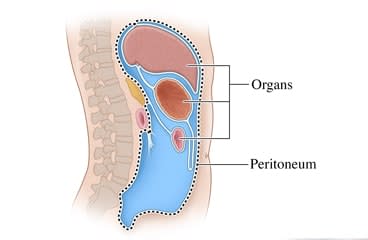What is peritonitis?

Peritonitis is an infection of the lining of the belly (peritoneum). It causes pain and swelling inside the belly. It may also cause a fever.
This infection can happen in people who use peritoneal dialysis (PD). PD uses a dialysis fluid and the lining of the belly to filter toxins from the blood. The fluid enters and leaves the belly through a soft tube called a catheter. The place where the catheter comes out of your body is called the dialysis access. You may get peritonitis if the catheter is not kept clean. You can also get it if the area around the access is not clean, even if you can't see any infection.
This infection is serious. Even if your symptoms are mild, you need medical care right away. Without treatment, the illness gets worse fast and can be life-threatening.
What are the symptoms?
Symptoms of peritonitis include:
- Swelling of the belly, which may feel hard (rigid).
- Severe pain and tenderness in the belly.
- Fever.
- Nausea and vomiting.
- Diarrhea.
- Dialysis fluid that is cloudy or changes color.
- Pus draining from the access site.
How can you prevent it?
Take these steps to help prevent peritonitis.
- Keep your access clean and dry. Check it every day for signs of infection, such as:
- Increased pain, swelling, warmth, or redness.
- Red streaks leading from the access site.
- Pus draining from the access site.
- Keep the end of your catheter covered when it is not in use.
- Always wash your hands with soap and water before you touch your catheter.
- Avoid swimming and bathing unless your dialysis team has told you it is okay. Always clean and dry your catheter and access right away after you get wet.
- Keep pets in another room during treatments. This will keep the room as clean as possible.
- Follow your doctor's instructions for showering.
How is it treated?
Your doctor may test your dialysis fluid. The test can help find the cause of your symptoms. And it can help your doctor decide which medicines will work best to treat the infection.
Your doctor will give you antibiotics to treat the infection. If you use peritoneal dialysis and the infection is minor, the medicine may be added to the dialysis fluid.
Your dialysis team may decide to change the way you do dialysis. The doctor may give you a new access while the old one heals. Or, instead of peritoneal dialysis, you may start using hemodialysis. It uses a machine instead of the lining of the belly to filter waste from the blood.
Follow-up care is a key part of your treatment and safety. Be sure to make and go to all appointments, and call your doctor if you are having problems. It's also a good idea to know your test results and keep a list of the medicines you take.
Where can you learn more?
Go to http://www.healthwise.net/patientEd
Enter G207 in the search box to learn more about "Learning About Peritonitis From Peritoneal Dialysis".
Current as of: October 11, 2024
Author: Ignite Healthwise, LLC Staff
Clinical Review Board
All Ignite Healthwise, LLC education is reviewed by a team that includes physicians, nurses, advanced practitioners, registered dieticians, and other healthcare professionals.

